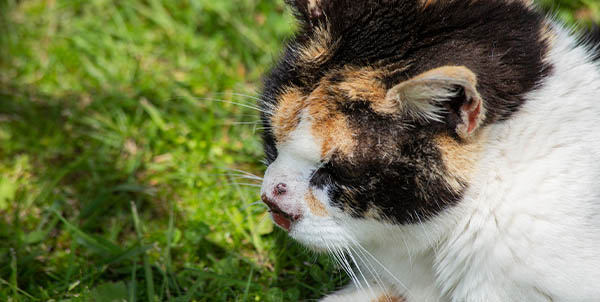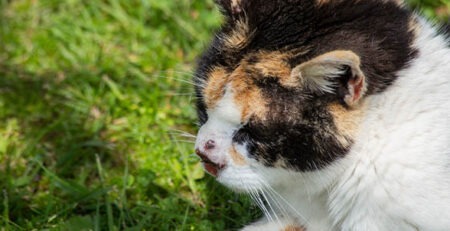Table of Contents
Squamous cell carcinoma of the cat: this is the most common infiltrating skin tumor affecting the nose and ears of our beloved kittens especially if they are white cats.
Squamous cell car cinoma(SCC) or squamous cell carcinoma is a malignant tumor of the squamous cells (keratinocytes) of the epidermis of dogs and cats.
Uncommon in dogs, it represents instead one of the most common neoplasms in cats.
It manifests as a crusty, blackish lesion generally located on the kitten’s nose and ears.

These lesions gradually evolve to the neoplastic state with ulceration and destruction of the surrounding tissue
Squamous cell carcinoma is mainly caused byexposure to ultraviolet light.
White cats or cats with white-colored areas on their coats are most at risk.
In fact, the coat represents a physical barrier to UV radiation, and d this is why squamous cell carcinoma appears in skin sites that are sparsely hairy, unpigmented, and therefore particularly photo-exposed.
Indoor cats, particularly those that spend most of their time near windows, can also manifest the condition.
Squamous cell carcinoma is infiltrating and moderately differentiated: here’s what that means
It has a slow onset and rarely presents metastasis whose spread to regional lymph nodes and lung is generally found in the advanced stages of the disease.
It is infiltrative because it tends to affect neighboring anatomic regions.
Squamous cell carcinoma cells under the microscope clearly look abnormal but still share some characteristics with surrounding normal cells by differentiating “moderately.”
This characteristic means that the diagnosis is not always immediate at both the macroscopic and cellular levels and makes in-depth diagnostic investigations necessary: chief among them is histological examination.
Histological examination for identification of neoplasm
Histological examination is an analysis conducted under a microscope of organic tissue samples taken by biopsy and allows identification:
- the type of tumor
- staging, which is how much the neoplastic cells diverge from healthy cells on a reference scale
- Proliferation, which is the rate at which cancer cells multiply and how aggressive the neoplasm is
If the diagnosis is established by histologic examination, the cat should be scanned for metastases (especially in the lungs), especially if the animal had increased lymph nodes on clinical examination.
This type of tumor grading makes it possible to establish a fairly accurate prognosis regarding the patient’s quality of life, disease progression, and therapeutic treatment options.
The treatment for squamous cell carcinoma
To treat feline cutaneous squamous cell carcinoma there are several therapeutic procedures to date, to be considered depending on the degree of development of the neoplasm and the site involved:
- cryotherapy (practiced with temperatures from -50° to -60°), which causes selective cellular destruction of neoplastic tissue by freezing it and consequently devitalizing it.
- radiotherapy
- chemotherapy, used for superficial lesions that involves the use of a source of high-energy X-rays which, when projected onto the tumor area, kill the neoplastic cells
- surgical excision, which remains the treatment of choice because it is the technique that gives the highest success rate in treating thepinnae (pinnectomy), eyelids, and nose(nosectomy)
Successful treatment always depends on timely diagnosis, but prevention also plays an important role.
How to prevent squamous cell carcinoma in cats?
If your cat is white, it is important that you put preventive measures in place.
First, avoid exposing your cat to direct sunlight and make a habit of smearing sunscreen on the ears and nasal surface, which provide some degree of protection.
Early detection, diagnosis, and treatment of squamous cell carcinoma results in a better prognosis.
If you have noticed suspicious scabs on your cat’s ears and nose, seek veterinary consultation immediately.
The veterinary doctors on our staff are available to you: book an appointment for a follow-up visit.
In addition, we remind you that in case of need and urgency Clinica La Veterinaria is always open h24 every day including holidays and with First Aid service from 8 pm to 8 am.
For the joy of seeing them HAPPY











